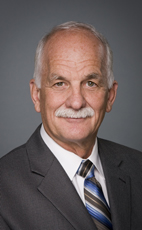Madam Speaker, as I listened to the member's comments, an issue came to my mind which deals with the Canadian Wheat Board. I know he touched on that very generally, but I am always troubled about this issue. I know that in my riding there is a division among farmers about whether the Canadian Wheat Board is a good thing or a bad thing. There is some controversy in that respect.
My colleague indicated that he would feel very comfortable for any farmer who wants to market their grain under the Wheat Board to be able to do that. I had always understood, until I was educated by farmers in my riding, that the Canadian Wheat Board was the Canadian Wheat Board, but in fact what I find is that it is only the western Canadian Wheat Board and that in Ontario farmers operate under very different rules.
That is, in western Canada our farmers are forced to sell their wheat through the Wheat Board, whereas in Ontario farmers have a measure of freedom of choice where they can use the wheat board there as essentially some kind of marketing board. It is not compulsory and they are not sent to jail for selling their grain outside of that Ontario wheat board.
Why would a government take this difference to parts of the country? One would think that if the system is good in one area of the country it should also be good for the other. And why the penalties that attach to western Canadian farmers? This is something I simply do not understand. Perhaps the member can explain it to me.

